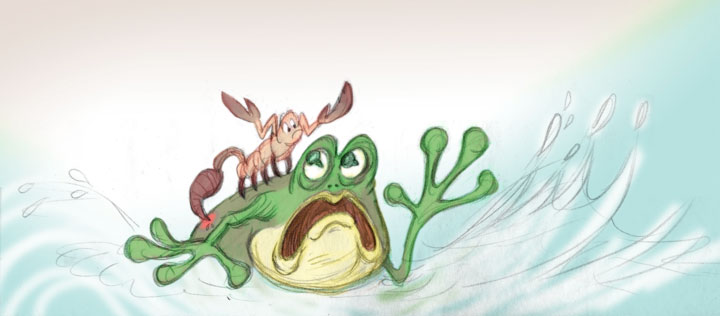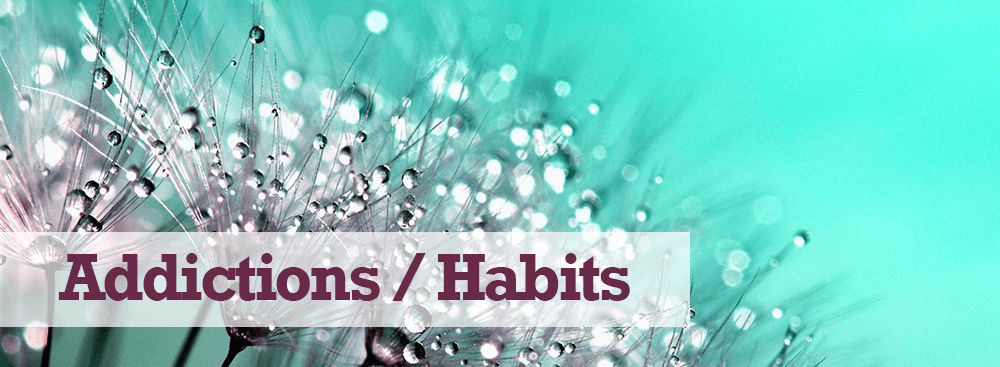Operating from your Learner/Researcher seems easy, doesn’t it? So why is it so difficult to change repeated patterns and conversations? The story of the scorpion and frog contains a powerful lesson that can finally help you make the shifts you’ve dreamed of making.
A scorpion, anxious to get to the other side of a stream and incapable of swimming, pleads with a frog to allow him to ride across on the frog’s back.
“Of course not,” says the frog. “You would sting me and kill me.”
“Preposterous!” replies the scorpion. “If I stung you, we would both die, you from my poison and I by drowning.”
Assured by this logic, the frog invites the scorpion to climb aboard. Halfway across, sure enough, the scorpion delivers the fatal sting.
“Now why did you do that?” asks the frog, “You’ve killed us both.”
“I’m a scorpion,” comes the reply. “This is what I do.”

The scorpion was behaving from his Knower/Judger with the full data that he would die if he executed from this persona. If you’ll be honest, I think you’ll discover that you do the same thing all the time.
How What You Know Gets in the Way of Change
The power of the Knower/Judger can be insidious. We can try to leave 25% of food on the plate to rid ourselves of that 25 pounds, but the K/J rule, seared into our brains, is: Clean your plate. Think of the starving (input some nationality here). It clobbers us.
Here are some other examples:
You don’t have time to research the safety and intelligence of a project your 13-year-old daughter wants to do, so you look at it on the surface and shoot from the hip. “No. That’s idiotic.”
A direct report enters your office with a great idea for running the manufacturing line that you’ve been in charge of for six years. “Yeah. Right.”
On the surface it appears to be easy to open our minds and explore doubt with the Learner/Researcher. To do that, however, we need to recognize when we’re living through the Knower/Judger. If we simply concede that “this is what I do,” like the scorpion, we continue to manage by fear, stretch the truth to get what we want, show up 10 minutes late, mount the toilet paper coming off the roll from underneath, take charge of a group, and behave like our DISC profiles says we behave. But with a little willpower, we think, we can change. Humbug! It’s far tougher than that.
Interacting from the Learner/Researcher persona is the key to successful personal interactions. But getting there is not simple. Step one is recognizing you’re not there!
A Good Test
Watch the other person the next time an interpersonal flare-up occurs. Notice any hints of what was coming? A curled lip? A finger pointing in your direction? An authoritative tone of voice or a patronizing approach?
These are all symptoms that the individual is projecting from the Knower/Judger. And what’s your usual response? Defensive or maybe even subservient. The Knower/Judgers have locked in, and this conversation probably has a predictable outcome.
Now here’s the hard part. Before engaging in a conversation, can you recognize you’re about to point a finger, curl a lip, or project a haughty voice? When you can recognize this point, you have a choice. You’re in charge! You’re about to offer your opinion, or tell someone what should happen—from your Knower/Judger.
We do it all the time. And the results keep coming out the same. If you just say, “It’s what I do,” the conversation collides and the diet goes to hell and the scorpion dies, too.
You Really Are in Charge
 These repeated conversations occur frequently in the work environment, in social environments, and in families. The outcome is usually 100% predictable. Change your part by withdrawing from your Knower/Judger. Smile instead of curling your lip. Open your palms instead of pointing a finger. Then watch the conversation go to places it’s never been before.
These repeated conversations occur frequently in the work environment, in social environments, and in families. The outcome is usually 100% predictable. Change your part by withdrawing from your Knower/Judger. Smile instead of curling your lip. Open your palms instead of pointing a finger. Then watch the conversation go to places it’s never been before.
At a recent Clarity Summit, one of my students offered the perfect metaphor for this. “Move a rock in the stream, and what happens downstream is never the same.” (Thanks, John!) When we recognize our Knower/Judger and choose not to use it, before it’s too late, the change in the conversation, relationship, level of trust, and level of understanding can be incredible. You’re no longer butting Knower/Judger heads. You’re exploring Learner/Researcher doubt.


